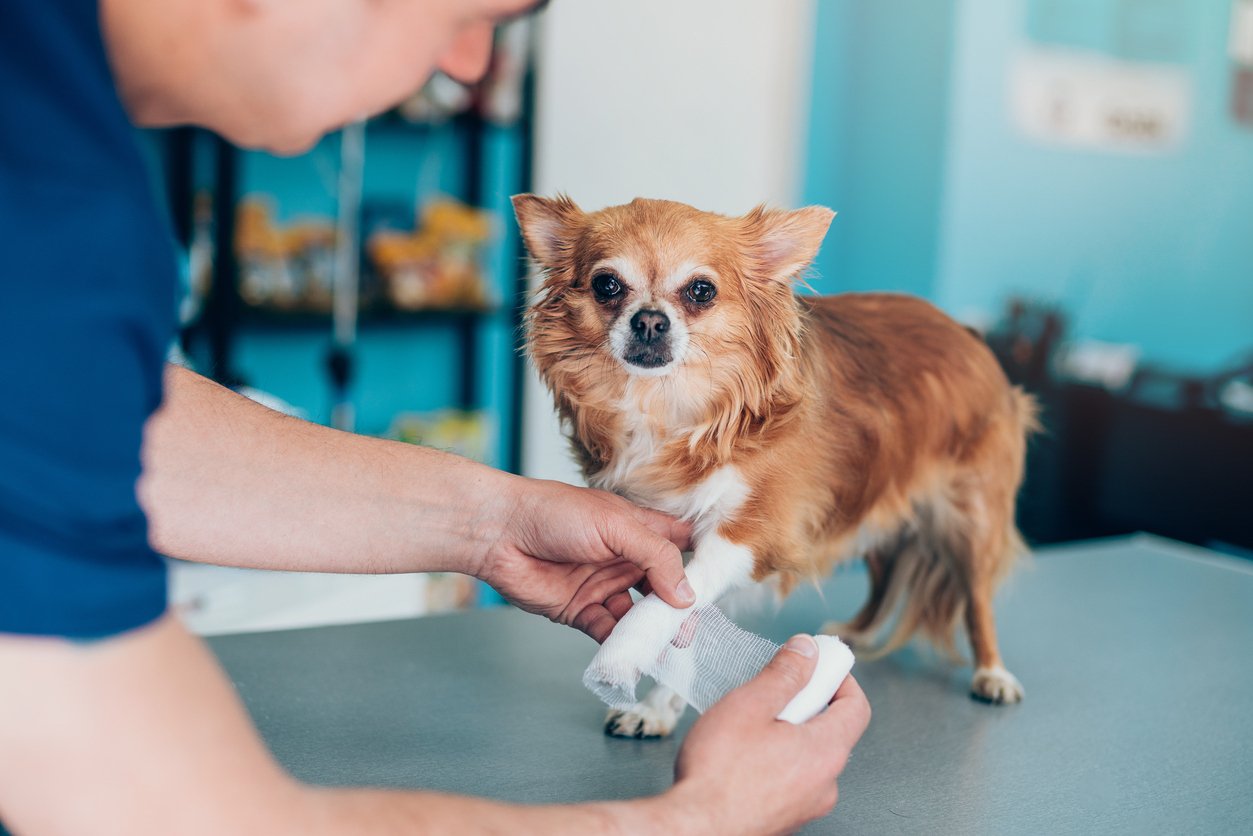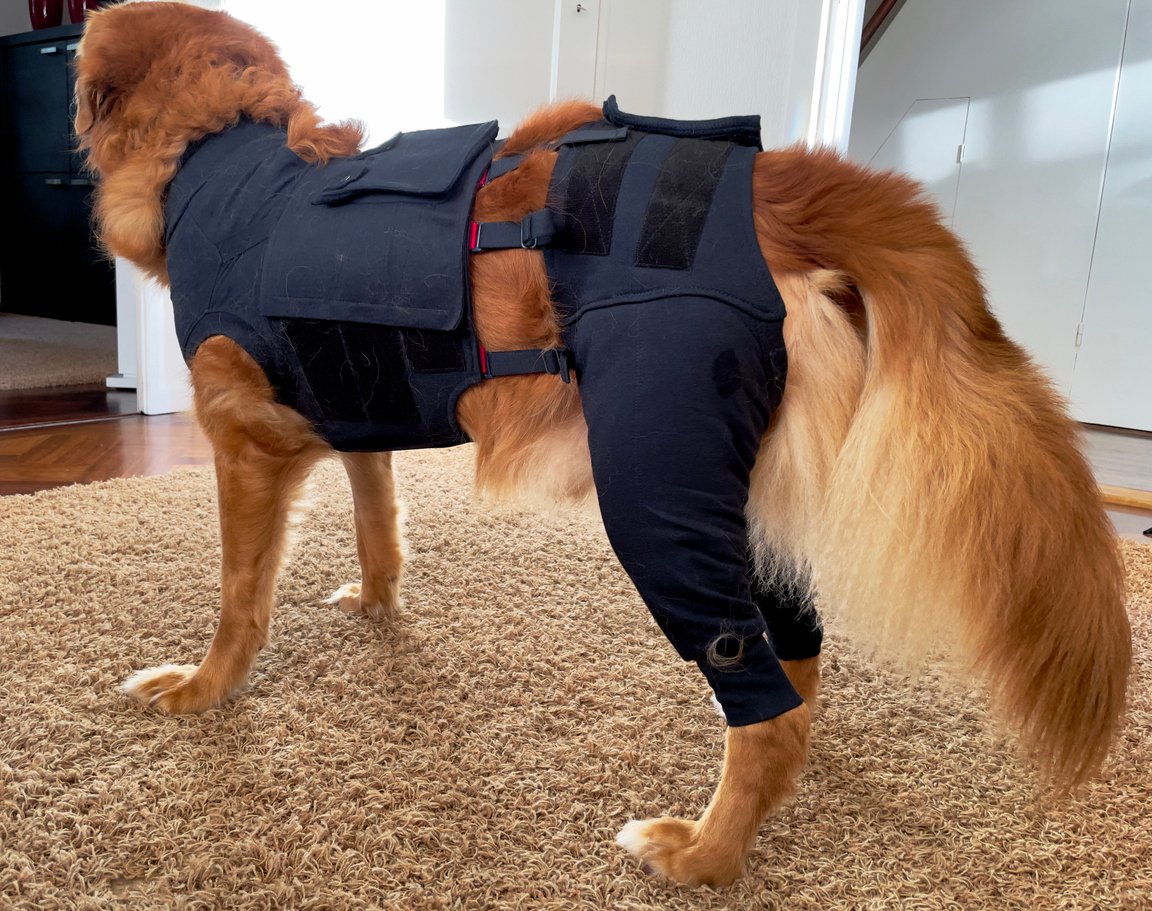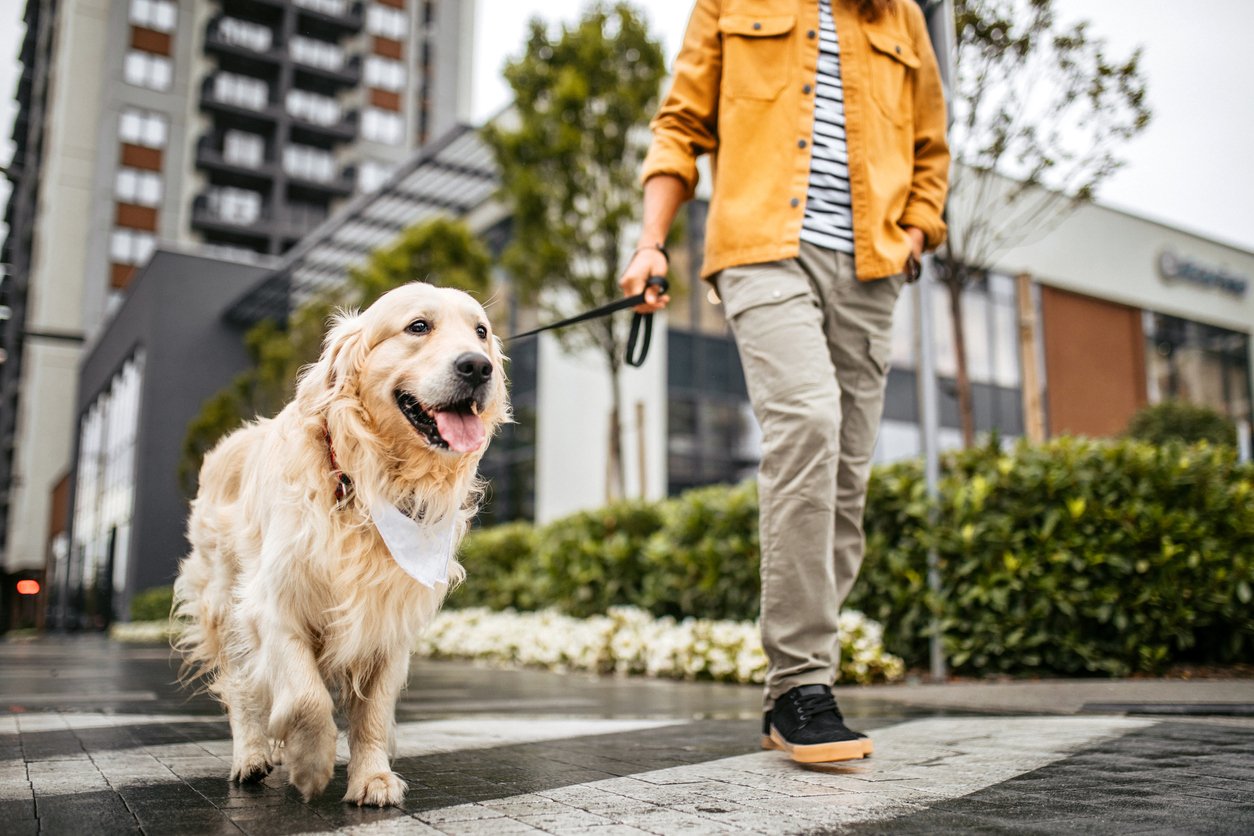Table of Contents
You do your best to keep your pup healthy and happy. Nothing is more important to you than giving your furry family member the quality and quantity of life they deserve.
But what if your dog suddenly stopped acting like their usual bouncy, excitable selves?
That loss of the pep in their step might be a sign they are battling a dog joint health problem. You need to watch out for the signs you’ve got dog hip and joint health on your hands so you can spot the early signs and address them before it worsens.
We’ll cover that in this post, as well as common dog joint health issues to watch out for, and how you can help prevent them in the first place.
Ready to go fetch this information for your pup? Let’s get started!
What Helps Dog Joint Health In Puppyhood?
Dog joint health problems are pretty ruff if you ask us.
And just because you have a puppy, doesn’t mean that you can leave taking care of their joints until later. In fact, some joint health problems can specifically affect puppies, like elbow dysplasia or hip dysplasia. Plus, overfeeding your large breed in their puppyhood can lead to problems later.
So setting your young dog up for success means keeping on top of health before things take a turn.
That means you need to keep a few things in mind, such as:
- How their dietary needs will change as they grow
- What exercises are appropriate for growing bodies
- Staying on top of regular vet visits
- Adding joint health supplements to help ensure the strong formation of bones, muscles, tendons, and ligaments to support their joints
- Paying close attention to your dog’s behaviour and demeanour for changes
- What genetic predispositions your dog’s breed may have
By getting their health on track from a young age, you can be better prepared for dog joint health issues later in their lives.
Common Dog Hip and Joint Health Problems

When you know what you’re up against, you can do better at finding the right solution.
And when it comes to dog joint health, that means reading up on the problems that most commonly affect dogs of all breeds and sizes.
In this section, we’ll get into the facts you need to know about each kind of these common dog hip and joint health issues.
Arthritis
Also known as osteoarthritis, dog arthritis is probably the most common dog joint health problem among all breeds. It can also affect dogs of varying ages, from young to old.
Arthritis is a degenerative joint disease that causes painful symptoms in the joints. That’s thanks to the wearing down of cartilage (the cushion between their bones) in your dog’s joints. Without that soft, cushioning effect of cartilage, their bones begin to rub against each other, causing bone-on-bone friction and lots of inflammation and pain for your pup.
Factors such as obesity, age, genetics, and your pup’s environment can lead to arthritis. It can’t be avoided 100% of the time, so the best thing to do is speak to your vet about how you can reduce the symptoms and pain associated with the condition.
Hip and Elbow Dysplasia
Another very common dog hip and joint health problem to be aware of — hip and elbow dysplasia.
While they affect two different parts of your dog’s body, both conditions are similar. In both cases, the ball and socket joint of both elbows and hips grow abnormally or atypically, causing there to be too much space for the ball part of the joint to rest snugly. It causes the joint to become loose and unstable, and in the long term, scar tissue will form around the joint.
This can make your pup suffer painful symptoms, and reduce their mobility, especially as they age.
Many breeds are predisposed to both elbow and hip dysplasia. Screening programs for breeds prone to the condition, like golden retrievers, exist to help you prepare your pup and avoid passing their condition on to any potential offspring.
Luxating Patellas

Have you been out in the park, running around with your pup, and suddenly you see their gait “skip”?
This can be the result of your dog’s patella sliding out of the joint, or dislocating, and popping back in eventually. It is caused by an atypical alignment of the tendon connecting to the patella and can worsen with age. You may notice your dog moving abnormally, like raising their hind limbs for several minutes or acute limping and lameness as well.
Though it sounds like it can be painful all the time, your dog will only feel the pain as their patella slides out of its groove in the joint, and that is why it can often seem like their symptoms are so brief.
Happening most commonly in small and miniature breeds, luxating patellas have also been shown to be more prevalent in females than males and can be brought on by arthritis as well.
Osteochondrosis
When your dog is growing, osteochondrosis can get in the way of good development and growth.
Osteochondrosis describes abnormal cartilage that grows on the end of a bone inside of the joint. This condition causes the cartilage to thicken and eventually, become weak and detach from the normal cartilage to form an uncomfortable flap. When the cartilage fully deteriorates and falls off, it can cause even more pain for your pup as the debris can cause synovitis and more cartilage breakdown.
It is most commonly found in large and medium dogs, and fast growth paired with too much calcium is suspected to be the culprit, though no exact cause is known.
Joint Trauma
The last common cause of dog joint health problems is a broad category — joint trauma.
Whether you are out exploring a new spot, or your dog gets too excited in a fit of the zoomies, accidents can happen. And dogs’ joints often bear the brunt of injuries.
Common joint trauma injuries include:
- Cranial cruciate ligament tear
- Dislocation
- Fractures
- Hyperextension
- Strains
- Sprains
The best thing to avoid your pup experiencing pain from a traumatic injury like those listed above is to play it safe in new spaces. Avoid letting your dog run off-leash in areas that aren’t enclosed so hazards like traffic and other dogs don’t cause problems. Always supervise your dog closely when they are playing inside, and add some mats or rugs to shiny surfaces to avoid trips and slips that can end in pain for your dog.
Breeds More Prone to Dog Joint Health Problems

As a pet paw-rent you may be wondering if your dog is going to inherit joint health problems due to their breed or genetics.
And while no one has a crystal ball to see what exactly your pup’s future holds, you can take what you know about their breed and family history into consideration.
A few specific breeds that are known to suffer commonly from dog joint health issues:
- German Shepards
- Labs
- Daschunds
- Rottweiler
- Saint Bernards
- Golden Retrievers
The problems commonly associated with their breed are outlined in the table below.
| Breed | Common Dog Joint Health Problem | Symptoms | Treatment |
| German Shepards | Hip Dysplasia |
|
|
| Labs | Dog Arthritis |
|
|
| Dachshunds | Legg-Calve-Perthes disease |
|
|
| Rottweiler | Cranial Cruciate Ligament (CCL) Disease |
|
|
| Saint Bernard | Osteochondrosis |
|
|
| Boston Terriers | Luxating Patella |
|
|
Although there are some indications mixed breed dogs suffer less from genetic disorders than their purebred counterparts, that is not always the case. So whether you have a mixed breed dog, or a purebred, you still want to keep their genetic makeup in mind.
Dog Joint Health Prevention Measures
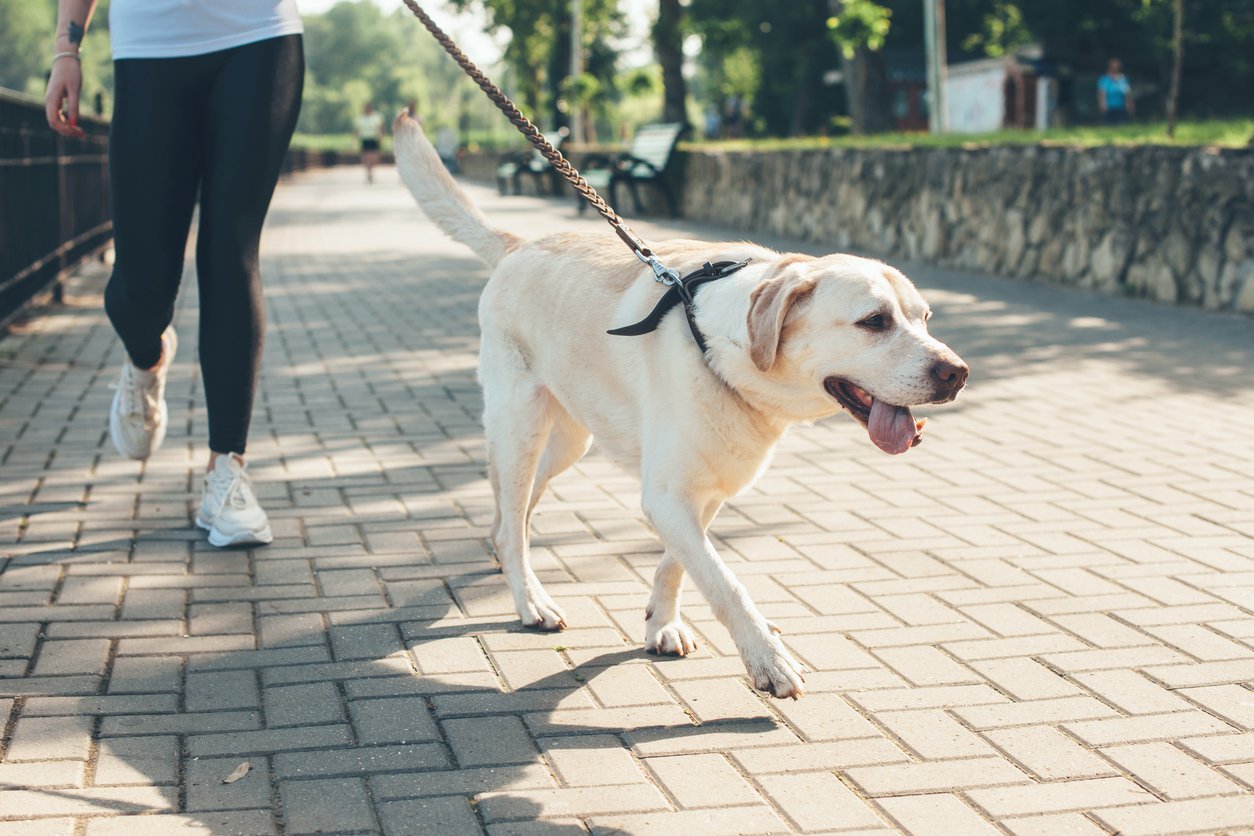
If there was something you could do to avoid pain for your pup, you certainly would, wouldn’t you?
While nothing can guarantee your pup can avoid the pain of a dog joint health problem, offering preventative measures is one way to ensure your dog doesn’t spend their golden years feeling less than golden.
You can implement easy additions into your daily routine that can reduce symptoms and delay the onset of conditions like arthritis. That way, your pup can feel their best for years to come.
Feed a Dog Joint Health Supplement
Hoping to build strong joint health from the inside out?
Offering a dog joint health supplement is one way to do just that!
By supporting your dog’s joints and their cartilage with supplements and vitamins, you can reduce the likelihood of painful symptoms associated with dog joint health issues like arthritis.
Dog joint health problems like arthritis or hip dysplasia can cause problems for your pup like:
- Inflammation
- Pain
- Reduced mobility
- Cartilage deterioration
Those are all unpleasant and downright nasty symptoms you don’t want your furry friend to face.
A dog joint health supplement addresses each of one of those common woes with ingredients that help repair and build back cartilage, as well as reduce inflammation and pain, giving your pup their mobility back.
The key to success is in the ingredients. A dog joint health supplement should provide you with a therapeutic dose of ingredients without any fillers.
The ingredients to watch for are:
- Glucosamine
- Chondroitin
- MSM
When you spot those ingredients on the supplement label, you know it’s a quality offering.
A dog joint health supplement like Integricare’s TRI-ACTA for pets line of products offers you those ingredients in small serving size and no fillers. Plus the knowledge you have a safe, lab-tested product on your hands — all of Integricare’s products carry a Health Canada approved low-risk veterinary health product designation.
Keep Weight Down
More weight can often spell trouble for your pet when it comes to dog joint health.
Young puppies can often seem to gobble down their dinners in the blink of an eye. And since they are busy fueling their growth, you may not think twice about giving them seconds. But that’s not accurate in the case of many dogs.
In fact, overfeeding or unrestricted feeding during puppyhood can lead to hip dysplasia and arthritis later in life. One study found that dogs subjected to a more restricted diet as puppies not only saw a lower body weight than their unrestricted counterparts but delayed onset of arthritis as well. Not to mention dogs who grow too quickly can have their joints form improperly, also leading to hip dysplasia and other dog joint health issues later on.
Obesity at any time in your dog’s life, especially for prolonged periods of their life, can be a large overall factor in developing conditions like arthritis.
Thankfully, the right nutrition and diet can mean you can keep their physique in check, as well as keep excess weight from bearing down on their joints.
Ensure your dog is eating a balanced diet, and talk to your vet if you are worried about their weight. They can help you develop a plan to help your dog lose weight and keep it off their joints for good.
Exercise Often

Getting exercise into your pup’s daily routine is something that helps fight dog joint health problems as well as other health concerns.
But you need to be careful to make sure they are getting the right kind and amount of exercise.
Young puppies need to avoid too much intense exercise, like biking, hiking, and running, as it can interfere with their growth and development.
Not to mention the clumsiness of a young pup. They can more easily take spills or falls, causing injury that can lead to inflammation and the creation of scar tissue in their joints.
Avoid sporadic, high-intensity exercise with your pup, and instead aim for consistent, low-impact options instead:
- Swimming
- Multiple short, slow walks per day
- Training games and exercises
- Canine stretches
By implementing daily exercise in small doses, your pup can stay fit and healthy without risking future damage to their dog joint health.
Avoid Injuries
Injuries can spell disaster for your pup now and in the future.
That’s why it’s important to consider injury prevention when protecting dog joint health.
By reducing the number of injuries to your dog’s joints, you are saving them from developing scar tissue and inflammation in their joints, something that can contribute to the stiffness and reduced mobility associated with joint troubles later in life. Additionally, some injuries can cause bones to become misaligned, or to dislocate from the socket, creating an immediate dog joint health problem that needs a vet’s attention.
Here are a few tips for keeping your pup safe from common injuries around the home:
- Top slippery hard surface floors with mats or rugs for added grip
- Add ramps to couches or beds so they avoid jumping up and down
- Watch out when playing fetch and avoid throwing a ball too high in the air
- Skip off-leash play in unenclosed spaces like parks to avoid traffic and other outdoor hazards
- Be aware of heights like decks and balconies where small dogs could easily tumble off of
3 Best Dog Joint Health Supplements
If you’re new to supplements for dog joint health, it can be an overwhelming task to choose the right one.
The first thing on your to-do list should be to learn how to read a supplement label. That way, you’ll know what to look for when you start shopping around. You’ll also want to read some dog joint health supplement reviews so you know roughly what to expect from a product before trying it.
No matter what supplements for dog joint health you’re considering, or what you choose, you should always consult your vet before starting your dog’s new regimen to make sure it’s compatible with their needs.
1. Integricare TRI-ACTA
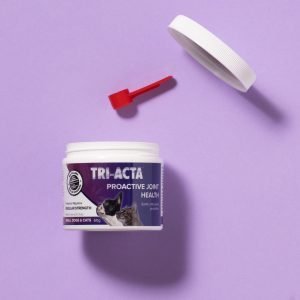
You don’t think we’d make a list of the best dog supplements for joint health and not put TRI-ACTA at the top, now would you?
Integricare’s TRI-ACTA offers you a host of benefits, including 100% active ingredients and zero fillers. And with small serving size, your pup will be more likely to accept their dose and you can spend less money in the meantime.
The table below summarizes the key ingredients that make TRI-ACTA such a powerful dog joint health helper.
| Ingredient | Benefit |
| Glucosamine |
|
| Chondroitin |
|
| MSM |
|
* Priced $23.99 – $64.99 CAD as of February 2022
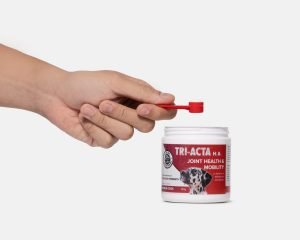 Bonus: TRI-ACTA H.A.
Bonus: TRI-ACTA H.A.
If you have a senior pup on your hands, or maybe one who has had an injury previously, they’ll benefit from Integricare’s TRI-ACTA H.A., which includes all the goodness of our regular strength product with the addition of hyaluronic acid to help improve the quality of their synovial fluid and in turn, their mobility.
* Priced $27.99 – $79.99 CAD as of February 2022
2. Zesty Paws Mobility Chews for Dogs
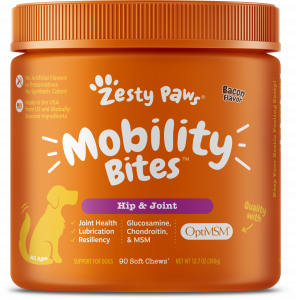
If you’re hoping to find dog treats for joint health that your pup will enjoy, Zesty Paws Mobility Chews for Dogs could be a great option for you. Complete with MSM, glucosamine, chondroitin, and Vitamin C & E, this product comes in a variety of sizes and flavours.
Be warned, though. As appealing as these dog treats for joint health can seem, they contain quite a few fillers. This means fewer active ingredients benefitting your pup than we’d like to see from a dog joint health supplement.
* Priced $34.34 – 82.72 CAD (converted from USD) as of February 2022
3. Purina Joint Health Dog Food
 Offering a few different blends for your pup’s unique needs, Purina has foods designed to support dog joint health. Specifically, their JM Joint Mobility Canine Formula offers glucosamine alongside a host of other nutrients like Vitamin E and Omega-3 Fatty Acids in a daily feed.
Offering a few different blends for your pup’s unique needs, Purina has foods designed to support dog joint health. Specifically, their JM Joint Mobility Canine Formula offers glucosamine alongside a host of other nutrients like Vitamin E and Omega-3 Fatty Acids in a daily feed.
While this option might seem like an easy way to get your dog the joint health support they need, you won’t find the other key ingredients we mentioned earlier in this formula. By missing out on MSM and chondroitin, your canine companion isn’t getting the full benefit of a true dog joint health supplement.
* Priced $38.22 – 126.15 CAD (converted from USD) as of February 2022
Dog Joint Health Questions and Answers

What Are the Best Dog Treats for Joint Health?
If you’re hoping to give your pet a treat and a supplement at the same time, there are definitely dog treats for joint health out there, like the Zesty Paws option we reviewed above.
Unfortunately, dog treats for joint health aren’t always the best way to get the therapeutic value out of a supplement. They often contain a lot of fillers, which aren’t always good for your dog, and less active ingredients helping dog joint health problems improve.
Consider a 100% active ingredient formulation that still offers you and your dog an easy to serve portion, like Integricare’s TRI-ACTA and TRI-ACTA H.A. instead.
TRI-ACTA H.A. for Pets
Our maximum strength formula is optimally designed to accelerate the formation of cartilage, minimize inflammation, expedite the healing process, and improve joint conditions.
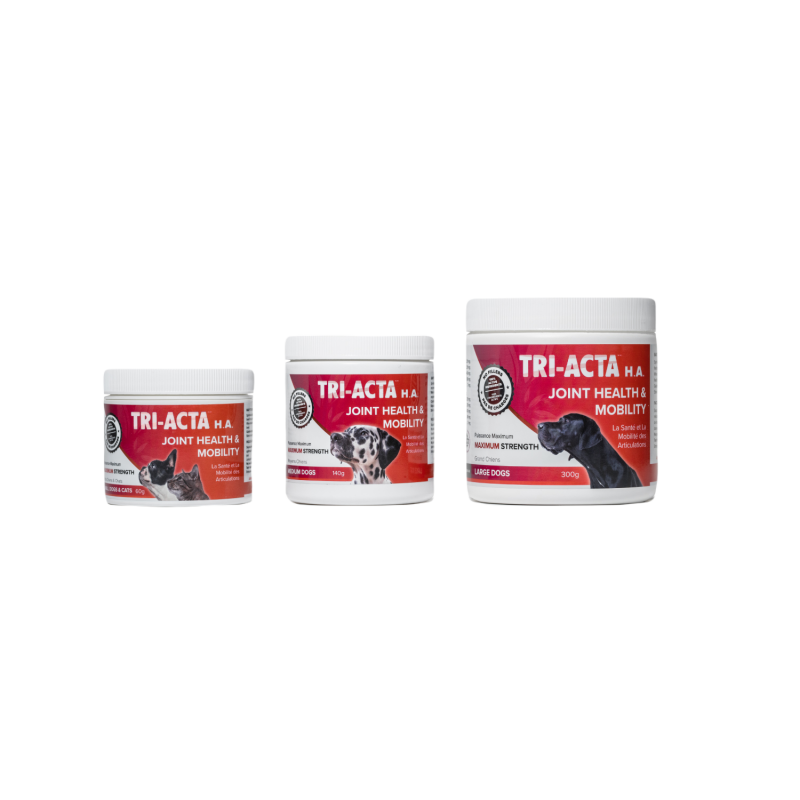
What Can I Give My Dog for Joint Health?
From food to supplements to treats, there are plenty of options that help your dog’s joint health.
No matter what format you choose to help support dog joint health, always be sure it includes key ingredients:
- Glucosamine
- Chondroitin
- MSM
- Hyaluronic Acid (H.A.)
And the less filler the better! Aim for something that contains minimal additions like grain, fats, and artificial flavours and colours.
Start Protecting Dog Joint Health
Now that you know everything there is to know about maintaining good dog joint health, it’s time to put that knowledge to work!
You know you need to choose the right tools to help you get the job done right, and when it comes to dog joint health, that means choosing a dog joint health supplement like TRI-ACTA and TRI-ACTA H.A. that offer 100% active ingredients tested by a third party to ensure for quality.
Integricare’s formulas have been trusted by pet owners for decades, and you can rest assured they are backed through science.
Now that’s what we call a pawsitively great solution!
Newsletter Signup
Subscribe to our newsletter to receive the latest news and exclusive offers.
.jpg?height=2000&name=Cliick_Integricare-DISPLAY-REVISEDV2%20(1).jpg)
Proactive & Therapeutic Joint Supplements
When given daily, Integricare joint supplements recover bone and joint injuries faster and help prevent mobility injuries from happening in the first place.




